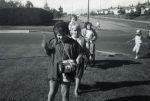Staging a parade on Laurel Street, circa 1960. An image from the Jewish Museum and Archives of British Columbia’s online exhibit, Oakridge. (photo from Gail Dodek Wenner via jewishmuseum.ca)
The oral history exhibit recently launched by the Jewish Museum and Archives of British Columbia on the postwar Jewish community of Vancouver’s Oakridge neighbourhood struck a chord and gave me pause. This is the area where my mom grew up – she was 13 when the shopping centre opened, the mall where my high school friends and I would later hold part-time jobs – and where my grandparents’ family home remained until a few years ago. And, it gave me pause because it reminded me that a little history can shake one’s sense of complacency.
Spending my teen years in Vancouver in the late 1980s, I sometimes wondered why the Jewish community didn’t live more north or more west – in short, closer to the beach, and in reach of sea and mountain views. Surely, part of the Jewish community’s move southward had to do with the wider lots and newer homes available as the city sprawled outward. But another important – and, to me, overlooked – part of the story is the legacy of racism and antisemitism that had infected the buying and selling of property in Vancouver.
One of the interviewees in the exhibit recalls a real estate agent telling her father, in reference to a house on King Edward Avenue between Oak and Granville streets, “This is a good neighbourhood because no Jews or Chinese are allowed.” By the fifties and sixties, however, Jews felt welcome and comfortable in the south Vancouver area, bounded by Oak and Cambie.
Times were different for my generation, growing up as multiculturalism was taking hold in a serious way and antisemitism and racism were increasingly seen as unmannered, even if they never fully went away.
In the mid-1980s, I recall accompanying my grandmother to an annual general meeting at the Richmond Country Club, where she regularly played tennis. I recall a discussion that evening about whether Jewish membership should be privileged. (An interview with the club’s current general manager, Mark Strong, confirms that, while the club’s written charter states that no member will be denied admission based on race, colour or creed, in practice, during that era, the club promoted Jewish membership.) After the meeting, I was outspoken in my criticism. To my 12-year-old sensibilities, trying to stack the membership of a recreational club with any particular religion or ethnicity seemed parochial and antiquated at best, and prejudiced and discriminatory at worst.
What I didn’t sufficiently appreciate then was the legacy of Jews being barred from many country clubs and, indeed, the Richmond Country Club had been founded by a group of Jewish businessmen and professionals in 1951 for that reason. If the club’s policies seemed antiquated to my 12-year-old ears, there was more resonance to it than I then realized. While I was trying to afflict the comfortable, these club members likely still felt the sting of affliction requiring comfort.
Today, the Richmond Country Club has a Magen David in its logo, and states on its website that “the spirit of inclusion remains one of our core values.” (I will leave aside the separate though partially related question of whether any country club can be economically inclusive.)
What does it mean to have grown up in what felt like a post-antisemitism era? I admit that, until recently, I have been suspicious of those who seek to find antisemitism at every turn. Not long ago, an older relative clipped a real estate ad for a cottage near Lake Winnipeg that stated it was in a “restricted” area. My relative took this to mean no Jews allowed. I did a little research and soon learned that, in this particular cottage zone, “restricted” meant something very different – no cars allowed. When I showed my relative what I’d found, he turned angry. It’s easy to get locked into patterns of victimhood.
But now my comfortable post-antisemitism bubble seems to be bursting. The Trump era has unleashed a torrent of hateful, xenophobic and bigoted discourse. Swastikas and racist graffiti have popped up on various houses of worship – including four Jewish institutions where I live, in Ottawa. Trump has appointed as chief counsel Steve Bannon, a man accused of trafficking in antisemitism via his website, Breitbart News.
Modern liberal polities require a constant sense of balance between comfort and vigilance. Too much comfort, and one risks complacency – for oneself and others. Too much vigilance, and one veers into paranoia. At the very least, we mustn’t forget history. Narratives of the past help explain collective fears, while suggesting what is necessary to make possible the kinds of societies that are worth fighting for.
Mira Sucharov is an associate professor of political science at Carleton University. She is a columnist for Canadian Jewish News and contributes to Haaretz and the Jewish Daily Forward, among other publications.

